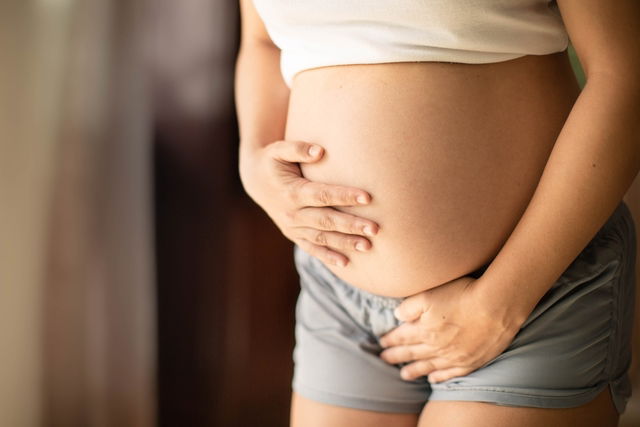Im 34 Weeks Pregnant and Have Irritation Bleeding
Vaginal pain is a common symptom during pregnancy that usually happens due to the baby's development, which can cause pressure on the vaginal tissue and decrease blood flow to the region, causing pain.
However, vaginal pain can also be a sign of more serious problems such as a urinary infection, STD's, or vaginismus, specially if it comes with other symptoms.
If you have other symptoms besides vaginal pain such as bleeding, vaginal discharge, itchiness, or a stinging sensation, it's important that you visit a gynecologist, to identify the cause of the vaginal pain and start the adequate treatment.

The main causes of vaginal pain during pregnancy are:
1. Normal baby development
While the baby grows and gains weight inside the uterus, it also causes an increase in pressure on the pelvic floor muscles, which are muscles that support the uterus and the vagina. This can cause an intense discomfort or pain in the vagina, and it's more common during the third trimester of pregnancy.
In addition, because of the pressure caused by the growing baby, there may be a decrease in blood flow to the pelvic area, which can cause the vagina to become swollen and more painful.
What to do: there are some ways that can help relieve pressure and reduce pain, such as not standing for too long, placing a cold compress on the pelvic area, and resting. Even though discomfort is more common at the end of pregnancy, it's important that you visit an obstetrician if the pain is too intense and stops you from walking or doing normal day-to-day activities.
2. Vaginal dryness
Vaginal dryness is also very common during pregnancy, due to the increase in progesterone and also the expectant mother's natural anxiety. Thus, often, pregnant women will experience less lubrication, which can cause pain during sexual intercourse.
What to do: it's important to identify the cause for the dryness, and also to visit a gynecologist who will be able to assess whether there is a need for a lubricant, changes in diet and/or exercise routines that help decrease anxiety.
3. Intense vaginal sex
Vaginal pain during pregnancy can also happen after intense vaginal sex which, due to the friction caused by penetration or lack of lubrication, may lead to vaginal irritation, swelling, and pain.
What to do: it's essential you get adequate lubrication before penetration in order to avoid lesions in the walls of the vagina and pain during sexual intercourse. If this is the case, it may also be advised for you and your partner to decrease the frequency and intensity of sexual intercourse, so that the vagina tissue is able to recover more quickly. If there is bleeding during sexual intercourse, please visit a gynecologist.
4. Vaginismus
Vaginismus is a condition where the vaginal muscles contract and cannot relax naturally, causing pain in the vagina and difficulty with penetration. This situation may appear during pregnancy or even be present before pregnancy.
What to do: it's important you consult a gynecologist or physiotherapist. These health professionals will assess the pelvic muscles to identify the cause of the vaginismus and from there they will indicate suitable treatment.
5. Rash
Sometimes expectant mothers can get a rash on the genitals when they use certain products that contain irritant ingredients such as soap, condoms, vaginal creams, or lubricants. This can cause swelling, itchiness, redness, and pain in the vagina.
What to do: it's important to identify the product that may be causing and allergy and stop using it. To relieve symptoms, you can place a cold compress on the external genital area. However, in cases in which symptoms do not improve or get more intense, it's important to visit an gynecologist, who will be able to identify the cause and start suitable treatment.
6. Urinary tract infection
A urinary tract infection is a common condition during pregnancy that happens due to changes in the body that encourage the development of bacteria and fungi naturally present in the genital area. As a result of a UTI you may have vaginal pain and discomfort, itchiness, burning sensation when peeing, and cloudy urine.
What to do:as it's an uncomfortable condition, it's important that you visit a gynecologist to get information on the best treatment, which may involve antibiotics or antifungal medication. It's also important that you drink plenty of water every day, follow a diet that is low in sugar, and wear comfortable clothes and cotton panties.
7. STD's
Sexually transmitted diseases, known as STDs, can cause vaginal pain in pregnancy, as is the case of chlamydia and genital herpes, and also itchiness and a burning sensation.
What to do: if you have any symptoms that may indicate an STD, you need to visit a gynecologist who will be able to confirm infection and start adequate treatment, which can involve the use of medication. The gynecologist will also recommend that you avoid having sex during treatment and that your partner also does the treatment to avoid reinfection.
8. Bartholin's Cyst
Vaginal pain during pregnancy may also occur when there are cysts in the Bartholin's glands, which happen due to an obstruction of the gland, which can cause swelling and vaginal pain, especially when there is inflammation in the glands.
What to do: if you have symptoms of inflammation in the Bartholin's glands, it's important you visit a gynecologist, who will examine your vagina and indicate suitable treatment. This usually consists of using pain medication and antibiotics, if there is an associated infection.
Im 34 Weeks Pregnant and Have Irritation Bleeding
Source: https://www.tuasaude.com/en/dor-na-vagina-na-gravidez/
0 Response to "Im 34 Weeks Pregnant and Have Irritation Bleeding"
Post a Comment